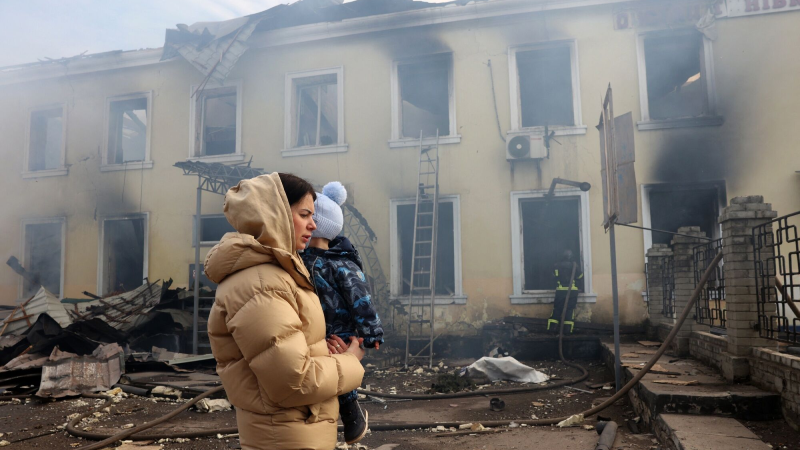
Russia May Have Targeted Ukrainian Civilians. And That’s a Crime
The indictments of two Russian military commanders by the International Criminal Court in The Hague are a reminder to all combatants that war has rules.
By Retired Admiral James Stavridis, Fletcher Dean Emeritus, and former supreme allied commander of NATO
Two Russian flag officers — a general and an admiral — were accused last week of war crimes and had warrants issued for their arrests by the International Criminal Court. The warrants made a strong case, pointing out the indiscriminate use of weapons. In particular, the prosecutor’s case rests on the willful use of aerial bombardment, both air-dropped bombs and long-range cruise missiles, to attack civilian infrastructure.
This may leave a lot of people scratching their heads: Isn’t this simply what happens in war? The answer is no — what Russia is doing in Ukraine falls outside the rules of warfare and someone needs to be held responsible.
The warrants should also serve as warnings to Ukrainian, Israeli and US commanders now involved in combat that they, too, need to do their utmost to protect civilians.
Let me start with my own experiences. During my long career as a US flag officer, I was deeply involved in combat operations — from the jungles of Colombia (advising our allies, the Colombian military), to the deserts of Libya during the United Nations-sanctioned intervention of 2011, to the vast spaces of Afghanistan and Iraq as part of the “forever wars.”
For the US military, education in the responsibilities and consequences of warfare begins early. From our service academies through our intermediate military schools and our system of higher war colleges, an important portion of officers’ educational process includes the study of war crimes. I remember as a midshipman at Annapolis spending hours studying the war crimes committed by US troops in Vietnam, most notoriously those of Lieutenant William Calley Jr. — convicted in the murders of 22 Vietnamese civilians, including children, at My Lai.
Throughout my subsequent education, we studied plenty of offensive tactics. I learned how to structure a campaign to create the maximum level of lethality against a legitimate enemy force. But a consistent component included learning the nuances of the Geneva Conventions, how to protect civilians in a war zone, and minimizing “collateral damage” even when striking military targets.
During the Libyan intervention in 2011, as the supreme allied commander of the North Atlantic Treaty Organization, I was the overall commander of the operations to stop the Libyan dictator Moammar Al Qaddafi from massacring his people. This mission was conducted under the auspices of the UN Security Council, but I knew my actions and those of my subordinates would be under a microscope.
My tactical commander was another 4-star Navy admiral, Sam Locklear. We chose a Canadian 3-star general and aviator, Charlie Bouchard, to lead the joint task force. Ultimately, we dropped more than 20,000 precision-guided weapons. And for every single one of those bombs, our tactical teams specifically reviewed the targeting package — always with the participation of the lawyers known as military judge advocates — to minimize unintentional damage on noncombatants and civilian infrastructure.
As I read the indictments against the Russians, General Sergey Kobylash and Admiral Viktor Sokolov, I was sickened by the allegations of use of weapons against the Ukrainian people. While the prosecution must ultimately prove its case, the targeting appears not just indiscriminate but actually directed against civilian infrastructure. Not only were civilian power plants attacked, but strikes were seemingly aimed at apartment buildings and other civilian structures. If proven true, this is a blatant violation of the laws of war and the Geneva Conventions.
This is not the first set of accusations in Ukraine by the court, which is located in The Hague and successfully prosecuted many of the Serbian war criminals following the Balkan wars in the 1990s. Others were directed against Russian President Vladimir Putin himself and Maria Lvova-Belova, the Kremlin’s “children’s-rights advocate.” They were charged with running a program that kidnapped children from Ukraine and brought them to Russia.
Whether the admiral and general, let alone Putin, ever see justice in The Hague is an open question. But the arrest warrants should send a chill through the spines of any senior commander in any war zone.
Thus Ukrainian officials will need to recognize that strikes inside Russia must be carefully circumscribed to avoid harming civilians or critical infrastructure. Inside Gaza, Israeli commanders must do all they can to avoid collateral damage, which so far appears to have been massive. US admirals commanding warships in the Red Sea must likewise analyze each strike against Houthi targets.
While neither Ukraine nor Israel (nor the US for the that matter) is party to the International Criminal Court, the implications of having an arrest warrant enforceable in the 124 member countries of the ICC is daunting for anyone.
Finally, it is worth considering how the advent of artificial intelligence in warfare will affect this kind of prosecution. This is not a fully theoretical question. As AI already becomes a commonly used tool in targeting and conducting swarming drones, for example, it is more essential to understand exactly who the culpable “person in the loop” may be. We are not going to be able to bring a computer program to justice, but the human tactical operators and their senior commanders will certainly be criminally liable. Computer learning cannot become a shield behind which high-ranking officers hide from accountability.
Principled militaries around the globe should not only to applaud the prosecution of Russian flag officers, but also to review their own procedures, ethics, morality and adherence to the laws of war and the Geneva Conventions.
No military is perfect in applying these vital rules, but a combination of education, constant attention to detail in operations, and actual prosecutions in institutions like the ICC can do much to protect the civilians caught in these terrible zones of war.
(This post is republished from Bloomberg Opinion.)
